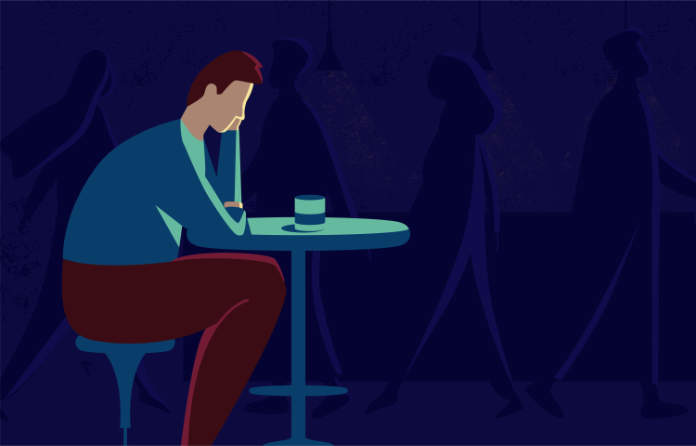Far more than just occasional over-indulging, binge eating disorder can be a serious issue for many people. Ever had days where you’ve struggled to resist that second helping of dinner or extra slice of moreish cake?
Most of us have – and that’s very normal. Diet culture can often mislabel this sort of thing as ‘bingeing’ – but binge eating disorder (BED) is much more than just enjoying your food or indulging in a few too many treats every now and then.
It can be a serious eating disorder that requires appropriate treatment from a medical professional.
Binge eating disorder – who is at risk
Eating disorders are believed to affect between 1.25 and 3.4 million people in the UK, and they’re often a lot more damaging and complex than many people realise. The Priory Group highlights that conditions like anorexia, bulimia and BED are responsible for more loss of life than any other mental health condition.

TV and films often portray people developing eating disorders during early adolescent years, and while this is generally true, the charity BEAT says it’s not unusual to experience eating disorders later in life too.
A report from the charity reveals cases have been known to develop in children as young as six, and in adults as late as their 70s. Eating disorders can also potentially affect anyone, of any gender or background.
We spoke to experts to find out more about BED, its causes, and some tips for managing and overcoming it…
Recommended: Mental Health Awareness Week: How to boost your mood with exercise.
What is binge eating disorder?
Alexia Dempsey, specialist eating disorder dietitian at Priory Roehampton Hospital says: “Daily life can often lead to negative emotions like stress, anger, sadness, fear and loneliness. Often these negative emotions can trigger emotional eating. It could be the glass of wine we drink as it’s ‘been a long day’, or the tub of ice-cream that’s on hand after a break-up.”

However, Dempsey explains that for some people, emotional ‘binge eating’ can be a regular demon that dictates a person’s day and their self-worth.
“Emotional eating often comes on suddenly and feels like it needs to be satisfied immediately, as it happens as a way of suppressing or distracting negative thoughts and feelings.
“It’s a form of self-soothing that, in the short-term, can feel functional, but in the long-term can support a cycle of difficult and distressing feelings followed by low self-worth,” she adds.
Symptoms of binge eating disorder
- Eating large volumes of food within a short period of time.
- Feeling out of control while eating and unable to stop or limit your food intake.
- Eating when you’re not hungry.
- Eating even when you are full or continuing to eat until you feel uncomfortably full.
- Secretly eating food or eating food on your own.
- Feelings of shame, guilt, depression or self-disgust following binge eating.
Binge eating episodes are often associated with eating very fast and until a person feels very uncomfortably full or unwell, as well as eating large amounts of food when they’re not physically hungry. This is often done alone, out of shame or embarrassment, and those affected may keep their binge eating episodes a secret from others too.
“In emotional overeating, an individual will use food as a distraction from the negative. Common foods include chocolate, crisps, sweets, and other foods that are considered to be a ‘treat’ or ‘naughty’.”
Dempsey says people with the disorder often report carbohydrate-based binges too. “One reason for this could be that the ingestion of carbohydrates increases the plasma ratio of tryptophan to other amino acids, leading to increased serotonin.
“Serotonin is a chemical that has been found to alleviate low mood and anxiety, so it makes sense that in times of stress, we crave foods that can boost these ‘happy’ hormones.
“Also, as these types of food are [often] considered ‘naughty’, the person binge eating can then feel guilty about their bingeing. ‘Treat’ foods are usually high in calories too, so if a person engages in stress eating regularly, their weight can increase and this can take a further knock on their self-esteem.”
Experts say that every case is different, and binges can either be spontaneous, or they may become a regular habit involving the person buying ‘special’ binge foods for this purpose.
Recommended: 10 healthy habits to continue after lockdown.
What is binge eating disorder caused by?
Many things can bring on a binge eating episode, but the charity BEAT says they most often occur when a person is experiencing negative emotions, like anger, sadness or loneliness. In this sense, emotional or psychological factors may ‘trigger’ the binge eating pattern, which may then become a coping strategy.

The causes of binge eating disorder are unknown but a few factors can increase the risk of developing it, such as having a family history of eating disorders, or a history of dieting or restricting calories.
What is the impact of emotional eating?
While there’s nothing wrong with enjoying the odd bit of comfort food, emotional eating can become problematic for many people, who find themselves battling powerful binge-eating cycles.
This can lead to weight gain, which brings with it a whole host of associated health risks (such as Type 2 diabetes and heart disease), and can also have a big impact on psychological wellbeing too.
While obesity isn’t always as straightforward as simply eating too much, Dempsey says overeating can be a key contributor – and this can often be dictated by emotions.
This emotional eating can then become a “regular, daily demon” that fuels low self-worth. “Emotional or stress eating is something that affects us all on some level. Daily life can lead to negative emotions like stress, anger, sadness, fear, boredom, and loneliness and, in turn, to emotional eating,” she explains.
Binge eating disorder treatment
Fortunately, experts say there are plenty of strategies people can try to help reduce and manage episodes of binge eating. However, while self-care tips can be helpful, it’s important to remember that seeking an accurate diagnosis from a healthcare professional is important for all eating disorders.
If you are concerned about your own eating patterns and binge eating, speak to your GP. Getting appropriate treatment as soon as possible can make a big difference to recovery and if necessary, your doctor can refer you for specialist help. It may be that you could benefit from addressing any underlying mental health issues, for example, plus counselling and cognitive behavioural therapy could help you with developing new healthier coping strategies.
That aside, there are self-help strategies that can help:
- Tap out of extreme dieting – Not only are restrictive ‘fad’ diets often unhealthy for your body, but being extremely ‘strict’ with your eating or skipping meals may encourage episodes of binge eating later in the day. A 2008 study of 496 teen girls found that using fasting methods to lose weight led to a higher risk of binge eating overall. Plus, if you’re predisposed to binge eating as a coping method for stress and negative feelings, failing to hit your goal weight can also trigger an episode of emotional eating.
- Try mindfulness meditation – There are lots of tools out there to help with mindfulness, from stress-busting apps to calming colouring books, and researchers have found that the soothing practice can even have positive effects for those struggling with BED. One 2014 review of 14 studies found that practising mindfulness meditation decreased the likelihood of binge eating in adults. Mindfulness meditation is a type of meditation where you shift your awareness to focus on what you’re sensing and feeling in the present moment, and it’s really easy to get started without any formal help. Apps such as Calm, Headspace and Portal can help you get started.
- Journal your day – Writing down your thoughts and feelings can help to identify any triggers for binge eating episodes, as well as enabling you to develop a healthier way to process tricky emotions and stress. A 2017 pilot study of an online self-help programme found that people who kept a regular food diary, alongside taking online CBT classes, were less likely to experience self-reported episodes of binge eating. There are lots of journal apps you can download to your smartphone and fill in while you’re out and about. Day One allows you to have multiple different colour-coded journals on the go, and you can add photos, videos, drawings or audio recordings to keep everything in one place. Or opt for a good, old-fashioned paper journal and pen!
Recommended: Mental Health Awareness Week: Why kindness is good for the mind.
How to stop binge eating – expert advice
There’s lots you can do to help tackle the patterns yourself too. Here, Dempsey shares eight tips to help curb the binge-eating cycle…
1. Have a plan
“Overeating can often be a result of ‘passive’ restriction. You might be running late so you skip breakfast, and then you find yourself too busy for lunch, leading you to rely on ‘grab and go’ snacks. The problem with doing this is that you feel hungry later in the day so you end up bingeing. To avoid falling into this habit, make sure to plan your food for the day to ensure you have regular meals.”
2. Have balanced meals
“Always try to make sure that there is an adequate balance in your meals, including all of the major food groups – carbohydrates, protein, veggies and fats. This will help you feel full and encourage slow gastric emptying and prolonged satiety.”
3. Don’t restrict

“Restricting can lead to bingeing. This includes restricting food groups as well as missing meals. In my experience, the moment you decide to ban chocolate, crisps or carbohydrates completely, you introduce the idea of these food products to your consciousness.”
4. Avoid distractions when eating
“Eating and watching TV, or using laptops and phones, means that you are not engaging with your food and are likely to miss your initial biological cues that you are satisfied with how much you have eaten.”
5. Change your environment
“If you feel like bingeing or are worried that you are about to engage in a binge, try and change your environment. If you usually binge in your front room, get up and move to a different area or head out for a brisk walk.”
6. Hydrate
“Being dehydrated can cause tiredness, sluggishness, poor concentration and irritability. Hunger can also cause this. It’s easy for us to mistake dehydration for hunger, so ensure you are drinking enough during the day. Aim for around 1.5-2 litres a day of fluid.”
7. Plan how to manage the feeling
“Sometimes, we need to distract ourselves from a feeling of wanting to binge. If your trigger time is straight after work, plan an activity or meet up with friends. If it’s late at night, when the kids are in bed or you are alone, have a list of pleasurable activities ready, such as a funny film or box set, have a bath or call a friend for a chat.”
8. Seek support
“Overeating or emotional eating can be highly distressing for an individual. If you are worried about your eating, seek support from a registered specialist professional.”
Concerned or worried about binge eating?
You can talk in confidence to an adviser from Beat by calling its helpline on 0808 801 0677 or youth helpline on 0808 801 0711.































































